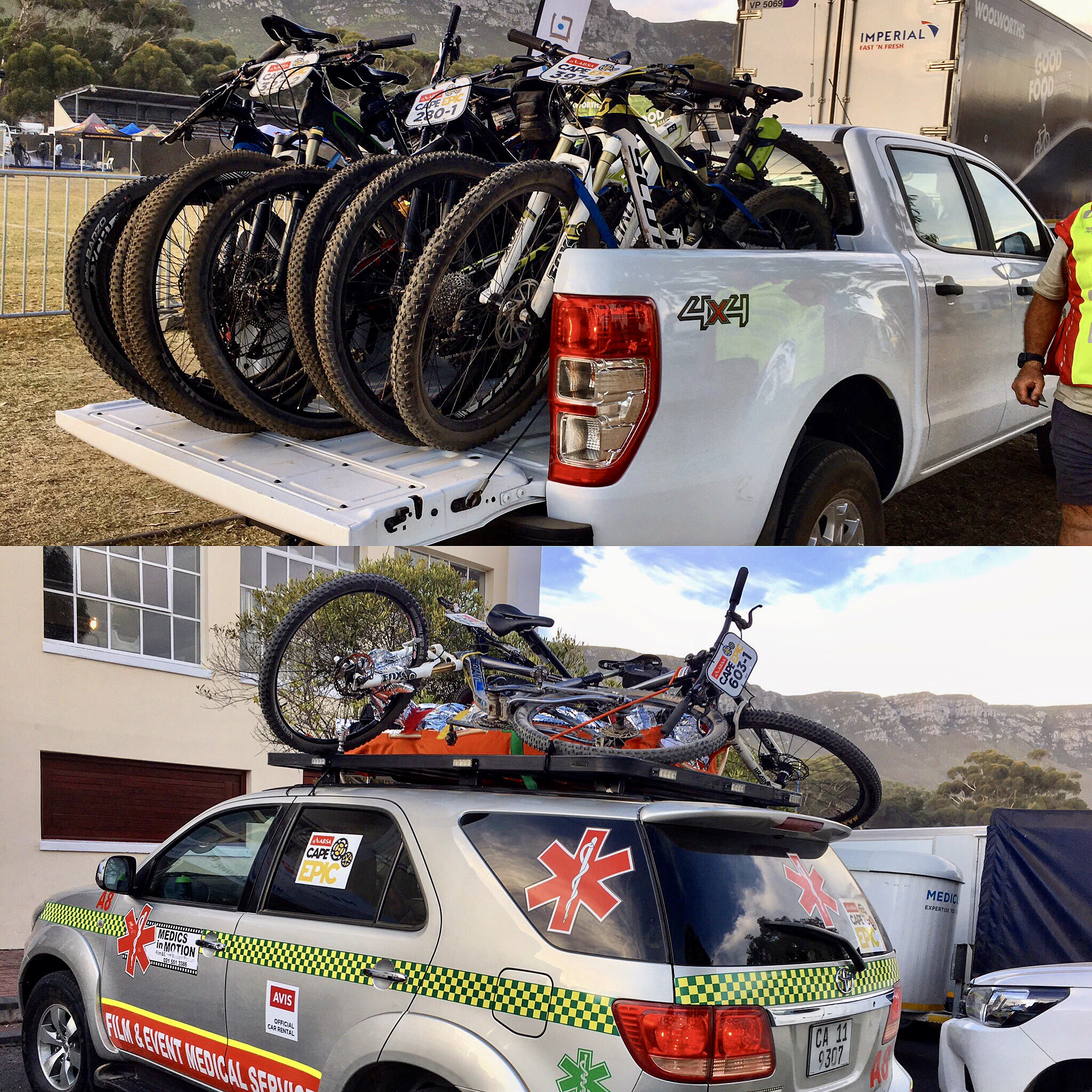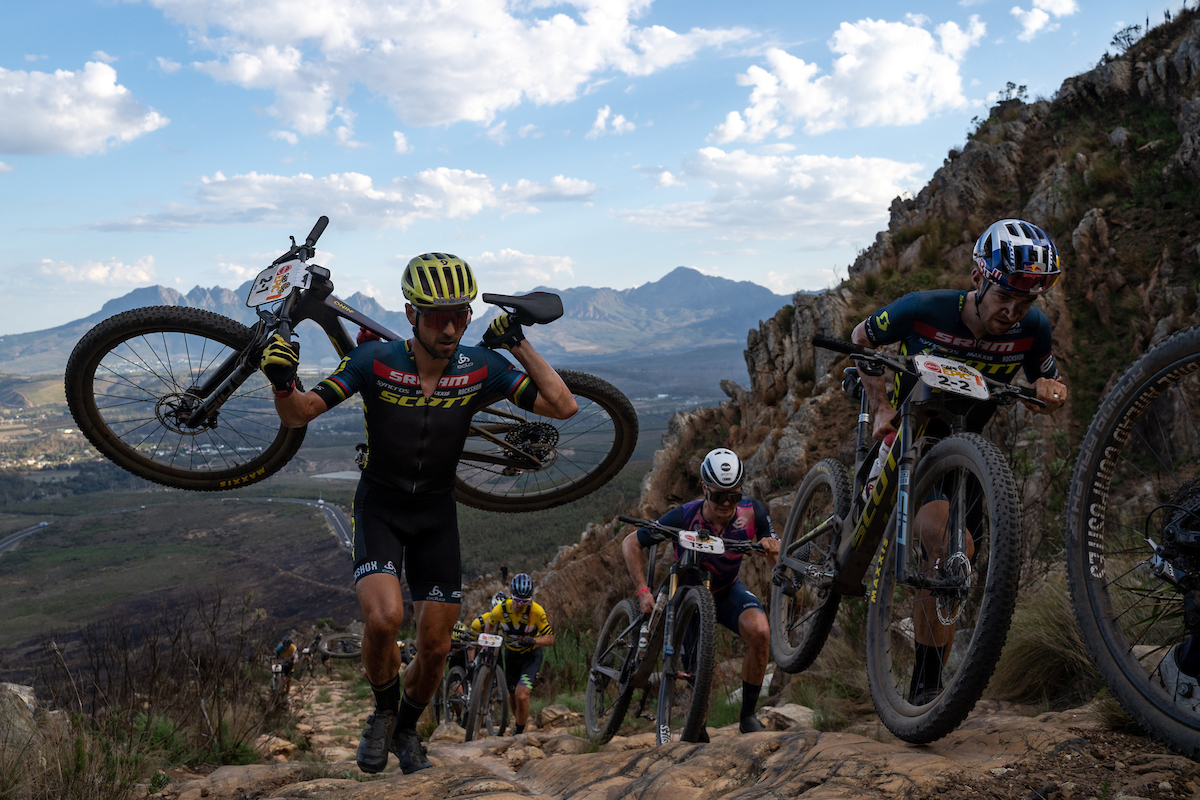Stage 2 of the 2022 Absa Cape Epic will go down as one of the most difficult in the race’s 18-year history. The 123km stage from Lourensford to Greyton was extended from 10 hours to 11 hours but still saw a total of 35 teams unable to finish or beat the cut-off time.
By Sean Badenhorst
At total of 474 two-rider teams started the transition stage, which included a hefty 2350 metres of climbing and 445 teams finished. But six of those teams finished outside of the 11-hour cut-off, effectively making the day’s total 35 teams that didn’t finish or make the cut-off.

This follows Stage 1 on Monday, which itself was particularly difficult due to extreme heat and a 3.5km climb that most riders had to walk, including the professional racers, claiming a total of 46 teams. After three days, the eight-day race has eliminated a total of 88 teams.
While many may feel that the first two stages of the 2022 edition have been particularly brutal, they’re no match for Stage 1 of the 2017 edition in Hermanus, which claimed 80 teams in a single day, mostly because of the heat. That stage holds the dubious record of the highest attrition rate in a single day.

Tuesday’s transition stage from Somerset West to Greyton was originally scheduled to have a 10-hour cut-off, but the organisers extended it by one hour after the leading men clocked a slower than anticipated time of over five hours, indicating the increased difficulty of the stage.
At 123km it was the longest stage of the 2022 edition and the longest Cape Epic stage since the 128km leg from Oak Valley to Worcester in 2015. But what made the day even more challenging was the strong headwind that blew for almost the entire route.

On stretches of open road, riders tried to find solace in bunches to shelter from the wind and conserve as much energy as possible. But sections of singletack made it impossible to remain in a group formation for an extended period and riders were visibly disturbed by the wind. A tailwind can be a bicycle racer’s greatest friend. But a headwind will always be the foe. Always. Many seasoned Cape Epic veterans said it was one of the most difficult stages they’ve ever done.
Only 31 teams broke six hours on Tuesday’s stage; 53 teams finished between six and seven hours; 93 teams finished between seven and eight hours; 122 teams finished between eight and nine hours; 94 teams finished between nine and 10 hours; and 41 teams between 10 and 11 hours.

Most long Cape Epic stages take the winners somewhere between 4 hours and 4 hours 30 minutes to complete. Nino Schurter and Lars Forster (SCOTT SRAM) won Tuesday’s stage in a time of 5 hours and 17 minutes.
In the last decade, since the majority switch to 29-inch wheels, there have been only five other stages that have taken the winners more than 5 hours to complete. Curiously five-time winner Christoph Sauser featured in winning four of them:
2012
Stage 3 – Christoph Sauser & Burry Stander 05 hours 31 minutes
Stage 5 – Christoph Sauser & Burry Stander 05 hours 06 minutes
2013
Stage 2 – Karl Platt & Urs Huber 05 hours 35 minutes
2015
Stage 3 – Christoph Sauser & Jaroslav Kulhavy 05 hours 01 minute
Stage 5 – Christoph Sauser & Jaroslav Kulhavy 05 hours 10 minutes

The route for the 2022 Absa Cape Epic covers 657km with a total of 17250 metres of ascent. It’s the second-most ascent of any edition of the race. Yes, wind, mud, sand, heat, cold, rough or loose terrain and steep gradients all increase the difficulty, but here’s a summary of the route stats from the past 10 editions:
| Year | Distance | Elevation | Ave gradient |
| 2012 | 781km | 16300m | 2.1% |
| 2013 | 698km | 15650m | 2.2% |
| 2014 | 718km | 14850m | 2.1% |
| 2015 | 739km | 16000m | 2.2% |
| 2016 | 647km | 14950m | 2.3% |
| 2017 | 651km | 14550m | 2.2% |
| 2018 | 653km | 13530m | 2.0% |
| 2019 | 630km | 16650m | 2.6% |
| 2021 | 611km | 14900m | 2.4% |
| 2022 | 657km | 17250m | 2.6% |
| Average | 678.5km | 15463m | 2.3% |
Note: the 2008 edition remains the most extreme route at 966km with 18529m of ascent – on 26-inch wheels!
Check out the race reports from Stage 2:
SCHURTER, FORSTER SPRINT TO STAGE 2 REDEMPTION
DE GROOT, FERRAND-PREVOT SOAR BACK INTO CONTENTION


